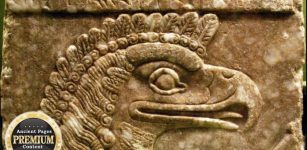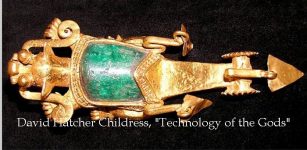Power Of Water In Beliefs Of Ancient Cultures
A. Sutherland - AncientPages.com - People have observed water and its powers over the centuries and created related myths and legends.
The sea symbolizes the water of the "sea womb," giving birth to the earth and all that lived on it. 'To return to the sea' is 'to return to the mother,' that is, to die. All life arose once in the ocean, reflected in the creation myths of many ancient cultures.
Water has been credited with purification and healing effects. One of many water places associated with healing is the Chalice Well in Glastonbury, England, where people have been using the spring since 3000 BC, glorifying these mineral-rich waters for their healing powers.
In the Vedas, water is "the most maternal" (mâtritamâh). In the beginning, everything was like a sea without light. In India, this element is generally regarded as the preserver of life, circulating throughout nature as rain. The Chinese consider water to be the residence of the dragon because all life comes from water.
This is a preview of our premium article available only to members of Ancient Pages.
Become a member to read more - Click here
If you are already a member and have logged in to your account, you can access the article here
See also:
Elusive Legendary Mist Witches Who Can Be As Wise As Dangerous
Tane: Lord Of The Forest Who Brought Three Baskets Of Knowledge To People In Maori Mythology
Ginnungagap From Which The World, Gods, Humanity And All Life Emerged In Norse Beliefs
Explore also: Ancient Pages Library Of Ancient And Unexplained Mysteries
More From Ancient Pages
-
 Unknown Highly Advanced Civilization Created Malta’s Cart Ruts With Sophisticated Machinery
Ancient Technology | Apr 26, 2014
Unknown Highly Advanced Civilization Created Malta’s Cart Ruts With Sophisticated Machinery
Ancient Technology | Apr 26, 2014 -
 Pre-Inca Temple With Colored Paintings And Carved Sculptures Discovered At The Los Paredones Archaeological Complex, Peru
Archaeology | Jul 8, 2024
Pre-Inca Temple With Colored Paintings And Carved Sculptures Discovered At The Los Paredones Archaeological Complex, Peru
Archaeology | Jul 8, 2024 -
 Mag Mell: Irish Tradition Of Otherworldly Paradise That Could Be Reached Through Death And Glory
Celtic Mythology | Feb 26, 2019
Mag Mell: Irish Tradition Of Otherworldly Paradise That Could Be Reached Through Death And Glory
Celtic Mythology | Feb 26, 2019 -
 Pharaoh Ramses II’s Sarcophagus On Display For The First Time In 50 Years
Artifacts | Apr 11, 2023
Pharaoh Ramses II’s Sarcophagus On Display For The First Time In 50 Years
Artifacts | Apr 11, 2023 -
 Adapa – Why Did The Wise Apkallu Refuse The Gift Of Immortality?
Featured Stories | May 9, 2019
Adapa – Why Did The Wise Apkallu Refuse The Gift Of Immortality?
Featured Stories | May 9, 2019 -
 Prehistoric Heavy Machinery Of The Ancient Times Or A Piece Of Jewelry?
Ancient Technology | Sep 12, 2018
Prehistoric Heavy Machinery Of The Ancient Times Or A Piece Of Jewelry?
Ancient Technology | Sep 12, 2018 -
 Puzzling Sabaean Inscription Found On A Large Clay Jar Near The Jerusalem Temple Deciphered
Archaeology | Apr 4, 2023
Puzzling Sabaean Inscription Found On A Large Clay Jar Near The Jerusalem Temple Deciphered
Archaeology | Apr 4, 2023 -
 Ancient Wooden Toy Boat And Ancient Shoes That Dates Back To The Reign Of King St. Olav – Found
Archaeology | Mar 1, 2017
Ancient Wooden Toy Boat And Ancient Shoes That Dates Back To The Reign Of King St. Olav – Found
Archaeology | Mar 1, 2017 -
 Madame de Pompadour – Powerful And Hated Mistress – Sex, Manipulation And Intrigue In Versailles
Featured Stories | Jul 12, 2018
Madame de Pompadour – Powerful And Hated Mistress – Sex, Manipulation And Intrigue In Versailles
Featured Stories | Jul 12, 2018 -
 Mysterious History Of Qin Shi Huang – First Emperor Of China
Featured Stories | Jan 17, 2016
Mysterious History Of Qin Shi Huang – First Emperor Of China
Featured Stories | Jan 17, 2016 -
 On This Day In History: First Battle Of The Mexican War Was Fought At Palo Alto – On May 8, 1846
News | May 8, 2016
On This Day In History: First Battle Of The Mexican War Was Fought At Palo Alto – On May 8, 1846
News | May 8, 2016 -
 Has The Body Of Legendary Pirate Black Sam Finally Been Discovered Off The Coast Of Massachusetts?
Archaeology | Feb 17, 2021
Has The Body Of Legendary Pirate Black Sam Finally Been Discovered Off The Coast Of Massachusetts?
Archaeology | Feb 17, 2021 -
 Pyramid Of Unknown Ancient Egyptian Queen And Hundreds Of Mummies Discovered In Saqqara
Archaeology | Nov 17, 2022
Pyramid Of Unknown Ancient Egyptian Queen And Hundreds Of Mummies Discovered In Saqqara
Archaeology | Nov 17, 2022 -
 Völuspá – Norse Prophecy Of The Völva, A Feared Shaman By The Vikings
Featured Stories | Mar 26, 2018
Völuspá – Norse Prophecy Of The Völva, A Feared Shaman By The Vikings
Featured Stories | Mar 26, 2018 -
 Cheomseongdae “Star-Gazing Tower” Is The Oldest Observatory In East Asia
Featured Stories | Mar 31, 2021
Cheomseongdae “Star-Gazing Tower” Is The Oldest Observatory In East Asia
Featured Stories | Mar 31, 2021 -
 Remarkably Well-Preserved Thermopolium With Frescoes, Food, And Jars Discovered In Pompeii
Archaeology | Dec 28, 2020
Remarkably Well-Preserved Thermopolium With Frescoes, Food, And Jars Discovered In Pompeii
Archaeology | Dec 28, 2020 -
 Your Neanderthal Genes May Prevent You From Metabolizing Drugs Efficiently
Archaeology | Jul 25, 2022
Your Neanderthal Genes May Prevent You From Metabolizing Drugs Efficiently
Archaeology | Jul 25, 2022 -
 DNA From 10,000-Year-Old Scandinavian Chewing Gum Reveals Stone Age Diet
DNA | Jan 19, 2024
DNA From 10,000-Year-Old Scandinavian Chewing Gum Reveals Stone Age Diet
DNA | Jan 19, 2024 -
 Australia’s First Marine Aboriginal Archaeological Site Questioned
Archaeology | Jun 22, 2022
Australia’s First Marine Aboriginal Archaeological Site Questioned
Archaeology | Jun 22, 2022 -
 Rare Ancient Drawings Offer Evidence Moluccan Boats Visited Australia From Indonesia?
Archaeology | May 31, 2023
Rare Ancient Drawings Offer Evidence Moluccan Boats Visited Australia From Indonesia?
Archaeology | May 31, 2023



